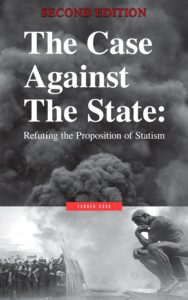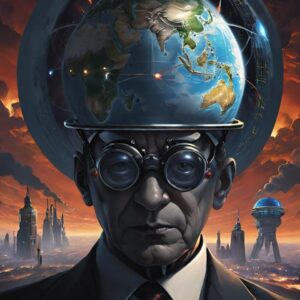Are you concerned about the growing infringement on our civil liberties and individual freedom? If so, you’re not alone. Many people are becoming increasingly aware of the government’s efforts to restrict our rights and control our actions. From surveillance programs to censorship laws, it’s clear that the government is cracking down on our freedom. But why?
Limiting Liberty, Strengthening Control
When dissecting why governments might hold a grudge against individual freedom and civil liberties, power balance plays a critical role. Notoriously thirsty for control, governments naturally gravitate towards structures that secure their hold on power.
Case in point? The U.S. Patriot Act. This legislation grants the government sweeping surveillance capabilities, underscoring the overemphasis on control at the cost of privacy rights, a bedrock of freedom. This law is emblematic of a greater trend, control gaining an upper hand over liberty.
But don’t mistake this for an exclusively American phenomenon. Across the realm, governments employ similar strategies, sometimes under the guise of national security, to increase their control and limit personal freedoms. Whether through intrusive legislation or executive overreach, the age-old struggle between liberty and control continues unabated.
Suppressing Dissent and Debate
Dissent and debate, vibrant threads in the fabric of society, are increasingly coming under fire. Around the earth, governments are deploying powerful tools to quell opposition and silence critical voices. Defamation laws, previously designed to protect reputations, are now weaponized to stifle free speech. Violence becomes a brutal reminder of the potential consequences of challenging the status quo.
Online censorship, a cyber-age instrument of control, buries dissenting opinions in the vastness of the digital world. This escalating battle isn’t about differing opinions anymore; it is about preserving the right to have them. It is about ensuring that debates remain a platform for progress, not a potential risk. It’s about safeguarding the essence of community, where the power of words should always outweigh the fear of reprisals. The challenge is daunting but essential, for a society where voices of dissent are silenced, is a society on the precipice of losing its freedom.
Maintaining Social Conformity
Social conformity, an alluring mantra governments often chant to orchestrate a symphony of homogeneity. The melody of a homogeneous society, while sonorous, can be stifling, drowning the unique tunes of individuality and curtailing the symphony of freedom of expression.
The craving for societal harmony should not translate into a culture of conformity that sidelines creativity. Instead, it should foster a symphony of diverse thoughts, ideas, and expressions, playing in harmony while preserving their unique notes. The grand challenge here is crafting a harmonious society that embraces individuality and encourages creativity, instead of suppressing them for the sake of uniformity.
Governments, while conducting this symphony, must strive to balance societal harmony with individual freedom, ensuring that the melody of conformity doesn’t overshadow the vibrant notes of individuality. A society where diversity and freedom are appreciated, not subdued, strikes the perfect chord, resulting in a masterpiece of societal harmony that doesn’t compromise individual freedom.

> Check Current Book Prices <
The Ruse of National Security
A cloak of national security is often draped over policies that infringe upon individual freedoms. The question arises, is national security being overly exploited as a justification for invasive procedures? Take, for example, the contentious issue surrounding the NSA’s data collection program. It’s thrust us into a spirited debate regarding the essence of security. Can privacy be compromised for an elusive assurance of protection? Our personal lives are exposed in the name of national safety, but at what cost?
While the concept of national security is crucial and inarguable, its usage to endorse intrusive measures is not without dispute. As we navigate through these murky waters, the dilemma remains. How much of our personal freedom are we willing to surrender in exchange for security? What are the boundaries, and who gets to draw them? And most importantly, are these ‘sacrifices’ actually contributing to our safety, or are they just tools in a larger scheme to control and manipulate?
National security is a noble cause, but it shouldn’t be a convenient excuse for suppressing freedom. As the lines between protection and invasion blur, it’s paramount that we remain vigilant. After all, the freedom to question and challenge is one of the liberties we’re trying to protect.

Controlling Information Flow
When it comes to holding the reins of power, a government’s most potent weapon could be controlling the flow of information. The ability to filter and shape narratives, or in extreme cases, blatantly silence opposing voices, can significantly influence public sentiment and thought. One needs only to consider the strategic use of “fake news” claims, not just in one country, but all over the realm. This tactic is frequently employed to dismiss reporting that doesn’t align with the preferred narrative.
Consider also the tight grip on the internet in some nations. The promise of the web as a free space for information exchange and debate is ruthlessly curtailed, with censorship ensuring the dominance of approved narratives. This chokehold on digital communication is not just about controlling the present; it’s about shaping the future. It directly undermines the ability of the public to make informed decisions, a cornerstone of a healthy society.
The implications of information control extend beyond politics. It affects all facets of life, from education and culture to economics and healthcare. When the flow of information is controlled, reality can be distorted, facts can be obscured, and truth can become a casualty. The stark reality is that in the era of digital communication and instant information access, controlling the information flow has become an all too familiar strategy in the playbook of those in power. It’s not just a challenge to freedom; it’s a threat to the basic ideals we hold dear.
The Paradox of Democracy
The crux of the issue lies in a deeply rooted paradox intrinsic to the very concept of government. Intriguingly, the framework, which is predicated on preserving freedom and upholding individual rights, often seems to be the stage where these liberties are curtailed by those wielding power.
This stark contradiction within the political system is not just perplexing, it’s profoundly troubling. It paints a picture of a system that appears to undermine the foundational pillars it was constructed upon. This scenario necessitates an introspective inquiry, can society truly flourish if the governing entities are apprehensive of the very notion of civil liberties and individual freedom?






